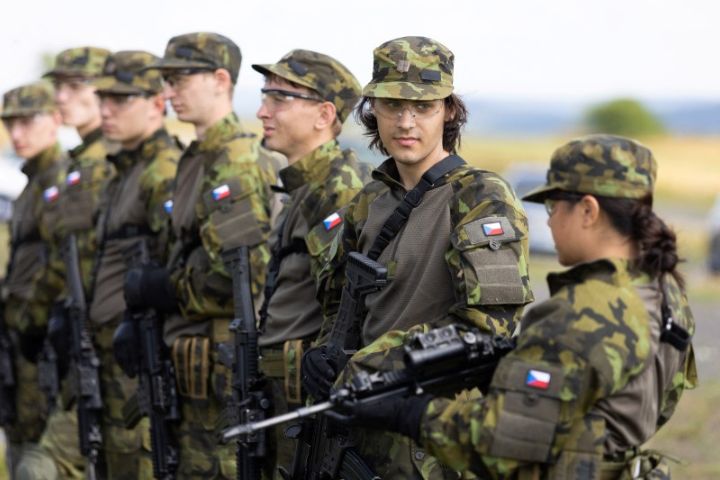In many Eastern European countries, there is a noticeable lack of interest among young people in enlisting for the army, possibly due to the prevailing belief that a prolonged war may be on the horizon.
This reluctance to join military service reflects uncertainties surrounding the duration and outcome of potential conflicts, leading to a hesitancy among the youth to commit to such obligations.
Army units understaffed and unable to reach combat readiness
Students are participating in a pilot Czech army program to boost enlistment numbers.
The Czech Republic, like most former Soviet-satellite states in NATO, has missed recruitment targets and struggled to maintain troop levels, leaving army units understaffed and unable to reach combat readiness.
The invasion of Ukraine by Russia serves as a reminder of Moscow’s potential threat to eastern Europe.
Around 80 Czech high school students are participating in a four-week training program in a closed military zone west of Prague, learning about army life, but General Karel Rehka has deemed the current system unsustainable.
He told Reuters that the 4th Rapid Deployment Brigade, which operates at only 50% capacity due to a shortage of soldiers, gives trainees an early taste of army life.
Rekha said “We want to deter any potential adversary in the future, If we don’t do anything about the lack of human resources in the military…, it may mean that we won’t be able to preserve our peace and to deter any potential enemy.”
According to the most recent army data, the Czechs met 56 percent of their recruiting objective in 2021 and it rose to reach 85 percent in 2022.
Eastern Europe, including Poland, Hungary, Romania, and Slovakia, faces challenges in recruiting new soldiers and maintaining experienced ones in the region.
Rehka added “We cannot do anything without people – if we modernise equipment and don’t have enough competent people and motivated people, that is all wasted money,”
“We also see the probability of Russian aggression against us as not impossible…within a few years,”
NATO nations in Western Europe face similar challenges, with 35-50 extra brigades needed to defend against Russia’s attacks on alliance territory.
Eastern European countries, who spent four decades under Soviet domination, are particularly concerned about the threat from a more assertive Russia under President Vladimir Putin.
Czech former deputy defence minister Tomas Kopecny, Prague’s envoy on Ukraine reconstruction issues, believes Russian aggression against Ukraine is not impossible within a few years, and that the country needs to have a certain amount of soldiers and capabilities.
Governments in eastern Europe are utilizing digital marketing campaigns, increasing enlistment bonuses, and considering a Czech defence ministry decree to lower medical requirements for career soldiers, reservists, and new recruits. However, attracting young people to enlist for less money remains a challenge.
Major General Karol Dymanowski, First Deputy Chief of the General Staff for Poland’s Armed Forces, said “We have challenges. They are related to the fact that the labour market here is very competitive,”
“We are trying to prepare more attractive offers for them, creating new financial incentives,”
In Poland, government and military authorities claim they are meeting recruitment targets and intend to boost recruitment limitations, but critics question if the goal of building a 300,000-strong army is achievable.
Eastern Europe’s largest country is aiming to increase defence spending to nearly 5% of GDP through a recruitment campaign called “Holidays With the Army,” offering basic military training for 18-35 year-olds. However, data shows that 9,000 professional soldiers left the service in 2023.
While Dymanowski stated that it is a “natural process,” Colonel Bogdan Sowa, head of the Organization and Recruitment Directorate in Poland’s General Staff, indicated that a significant number of soldiers quit the army within a few years after starting duty. “We are trying to prepare more attractive offers for them, creating new financial incentives,” Sowa said.
Hungary’s military is launching a media campaign to find new soldiers by the end of 2024, using billboards, advertisements, and a military-themed TV series. Romania’s government has also started enlistment drives after data showed 43% of officers’ positions and 23% of soldiers’ positions were unfilled.
Romania has four Patriot missile defense batteries, but only two are operational, and the government has purchased a number of F-16 fighter jets but does not have enough skilled pilots to fly them.
A defence source told the reporter “One must look at what laws need to be changed, not only in Romania but in other countries, to incentivise these people to stay,”
Romania and other countries are optimistic about a new generation of soldiers, including Czech high school student John Dunka, who is participating in the army’s summer camp near Prague. Dunka believes wearing the uniform brings pride and is grateful for the opportunity to participate in such a camp, despite the global events.





GIPHY App Key not set. Please check settings